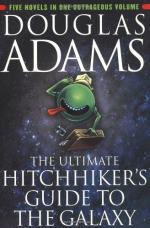|
This section contains 1,775 words (approx. 5 pages at 400 words per page) |

|
Woodford is a doctoral candidate at Washington University. In the following essay she examines the search for the meaning of life in The Hitchhiker's Guide to the Galaxy.
The first thing that readers and critics usually notice about Douglas Adams's novel, The Hitchhiker's Guide to the Galaxy, is that the book, written in a sharp and witty style, is remarkably funny. What may seem less obvious to readers, and what has often puzzled critics, is the meaning behind this light, clever exterior. David Leon Higdon has noted that imagining the end of the world has long been a tradition in science fiction, as it has been in myth and theology; and Brian Aldiss has observed the tremendous impact that the invention of bombs, which could conceivably cause the end of the world, have had on science fiction and science fiction writers. But while Adams's book does describe...
|
This section contains 1,775 words (approx. 5 pages at 400 words per page) |

|




